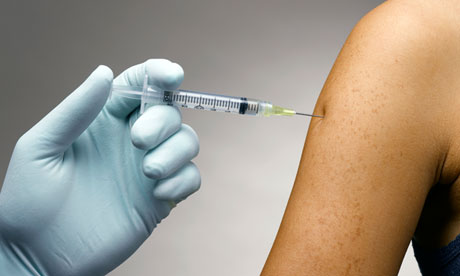
The first vaccine to protect children against meningitis B, which can kill or disable them, has been rejected by the government's advisory committee for use in the UK.
The Joint Committee on Vaccines and Immunisation (JCVI) said there was not enough evidence that Bexsero, developed by the Swiss pharmaceuticals giant Novartis, will protect children well enough to justify routine vaccination. The decision has dismayed meningitis charities, which have been campaigning for the vaccine since it was licensed in January.
The Meningitis Research Foundation called on its supporters to lobby MPs to press for a change of heart by the JCVI.
"This is the disease most feared by parents," said Chris Head, the Meningitis Research Foundation chief executive. "It kills more children under five than any other infectious disease and leaves survivors with life-changing disabilities. Today's news is a severe blow for everyone campaigning against this dreadful disease. We know every delay costs lives and leaves many more with lifelong disabilities.
"The UK's child mortality rates are among the highest in Europe. We simply cannot afford to let this licensed vaccine hang in limbo any longer. There is a tiny window of opportunity over the holiday season to encourage a change of heart and we are urging our members and supporters to lobby their MPs while we submit yet more, potent arguments to the JCVI on why this vaccine is vital."
But the JCVI, after careful consideration of all the research, including studies of the vaccine commissioned in the UK, said there was not enough evidence that the vaccine would work well enough to justify its introduction.
The vaccine has been licensed by the European authorities "in the absence of key data to support an assessment of effectiveness and cost-effectiveness", it noted. No country has yet taken it up in a national immunisation programme.
"This is a very difficult situation, where we have a new vaccine against meningitis B but we lack important evidence," said Prof David Salisbury, the director of immunisation at the Department of Health.
"We need to know how well it will protect, how long it will protect and if it will stop the bacteria from spreading from person to person. We need to work with the scientific community and the manufacturer to find ways to resolve these uncertainties so that we can come to a clear answer."
The committee said the vaccine could be given to people who are at particularly high risk of meningitis B and also lab workers who could be exposed to the bacterial infection.
But, it said: "On the basis of the available evidence, routine infant or toddler immunisation using Bexsero is highly unlikely to be cost-effective at any vaccine price based on the accepted threshold for cost-effectiveness used in the UK and could not be recommended."
The data on the effectiveness of the vaccine comes from measuring the levels of antibodies to the meningococcal bacteria in the blood of vaccinated individuals, rather than from observing how many vaccinated versus unvaccinated children fall ill.
Those trials would be hard to do because - fortunately - the numbers of children getting meningitis B have fallen. There were 613 lab-confirmed cases and 33 deaths in the year 2011/2012. One in 10 survivors will have major physical and/or neurological disabilities.
0 comments Blogger 0 Facebook
Post a Comment